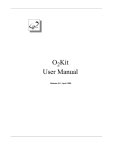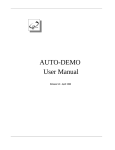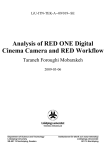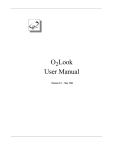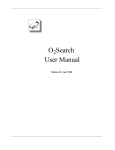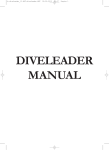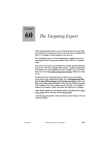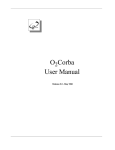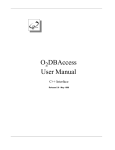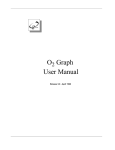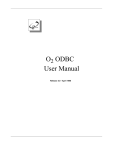Download O2 Makegen User Manual
Transcript
O2 Makegen User Manual Release 5.0 - April 1998 Information in this document is subject to change without notice and should not be construed as a commitment by O2 Technology. The software described in this document is delivered under a license or nondisclosure agreement. The software can only be used or copied in accordance with the terms of the agreement. It is against the law to copy this software to magnetic tape, disk, or any other medium for any purpose other than the purchaser’s own use. Copyright 1992-1998 O2 Technology. All rights reserved. No part of this publication can be reproduced, stored in a retrieval system or transmitted in any form or by any means, electronic, mechanical, photocopy without prior written permission of O2 Technology. O2, O2Engine API, O2C, O2DBAccess, O2Engine, O2Graph, O2Kit, O2Look, O2Store, O2Tools, and O2Web are registered trademarks of O2 Technology. SQL and AIX are registered trademarks of International Business Machines Corporation. Sun, SunOS, and SOLARIS are registered trademarks of Sun Microsystems, Inc. X Window System is a registered trademark of the Massachusetts Institute of Technology. Unix is a registered trademark of Unix System Laboratories, Inc. HPUX is a registered trademark of Hewlett-Packard Company. BOSX is a registered trademark of Bull S.A. IRIX is a registered trademark of Siemens Nixdorf, A.G. NeXTStep is a registered trademark of the NeXT Computer, Inc. Purify, Quantify are registered trademarks of Pure Software Inc. Windows is a registered trademark of Microsoft Corporation. All other company or product names quoted are trademarks or registered trademarks of their respective trademark holders. Who should read this manual This manual describes how to build O2 applications by creating makefiles which invoke O2 and system tools. O2Makegen generates a platform dependent makefile from platform independent information stored in a configuration file. O2Makegen may be utilized for building applications using C++, O2C, C and O2Engine API. Other documents available are outlined, click below. See O2 Documentation set. TABLE OF CONTENTS Th is m an u al is divided in to th e followin g ch apt er s: • 1 - In t r odu ction • 2 - Ru n tim e Libr ar y • 3 - Exam ple C applicat ion O2 Makegen User Manual 5 TABLE OF CONTENTS 1 The Build Process 9 1.1 System Overview......................................................................10 1.2 The O2Makegen tool ................................................................12 1.3 Using O2Makegen ....................................................................14 1.4 Invoking O2Makegen ...............................................................16 2 O2Makegen Configuration File 19 2.1 Introduction ..............................................................................20 2.2 The configuration file syntax ..................................................20 2.3 Basic options............................................................................21 2.4 O2 specific options ..................................................................28 2.5 Building a C++ application ......................................................29 2.6 Building a C application ..........................................................34 2.7 Building an O2C application ...................................................35 2.8 Building an O2Engine API application ...................................36 2.9 Adding your own makefile.......................................................37 3 Customizing O2Makegen 39 3.1 Template files............................................................................40 3.2 Syntax of a template file ..........................................................40 3.3 List of modifiable macros........................................................42 4 Troubleshooting Guidelines 47 5 Reference Guide 49 5.1 Options of the O2Makegen tool ..............................................50 5.2 Options of configuration file ...................................................51 6 O2 Makegen User Manual TABLE OF CONTENTS INDEX O2 Makegen User Manual 55 7 TABLE OF CONTENTS 8 O2 Makegen User Manual 1 1 The B uild Process GENERAL OVERVIEW OF THE O2MAKEGEN TOOL Congratulations! You are now a user of the O2Makegen tool! This chapter gives an overview of the O2 system and describes the different steps in binding together the layers of an O2 application to build an executable. The chapter is divided into the following sections: • Syst em Over view • Th e O2Mak egen t ool • Usin g O2Mak egen • In vok in g O2Mak egen O2 Makegen User Manual 9 1 The Build Process 1.1 System Overview The system architecture of O2 is illustrated in Figure 1.1. External Interfaces Development Tools O2 Dev. Tools Standard Dev. Tools O2 Makegen C OQL O 2C C++ Java Database Engine O2Engine O2Store O2ODBC O2Corba O2DB Access O2Web Fi gu r e 1 .1 : O2 Sy st em Ar ch i t ect u r e The O2 system can be viewed as consisting of three components. The Database Engine provides all the features of a Database system and an object-oriented system. This engine is accessed with Development Tools, such as various programming languages, O2 development tools and any standard development tool. Numerous External Interfaces are provided. All encompassing, O2 is a versatile, portable, distributed, high-performance dynamic object-oriented database system. Database Engine: 10 • O2Store The database management system provides low level facilities, through O2Store API, to access and manage a database: disk volumes, files, records, indices and transactions. • O2Engine The object database engine provides direct control of schemas, classes, objects and transactions, through O2Engine API. It provides full text indexing and search capabilities with O2Search and spatial indexing and retrieval capabilities with O2Spatial. It includes a Notification manager for informing other clients connected to the same O2 server that an event has occurred, a Version manager for handling multiple object versions and a Replication API for synchronizing multiple copies of an O2 system. O2 Makegen User Manual System Overview Programming Languages: O2 objects may be created and managed using the following programming languages, utilizing all the features available with O2 (persistence, collection management, transaction management, OQL queries, etc.) • C O2 functions can be invoked by C programs. • C++ ODMG compliant C++ binding. • Java ODMG compliant Java binding. • O2C A powerful and elegant object-oriented fourth generation language specialized for easy development of object database applications. • OQL ODMG standard, easy-to-use SQL-like object query language with special features for dealing with complex O2 objects and methods. O2 Development Tools: • O2Graph • O2Look Create, modify and edit any type of object graph. Design and develop graphical user interfaces, provides interactive manipulation of complex and multimedia objects. • O2Kit Library of predefined classes and methods for faster development of user applications. • O2Tools Complete graphical programming environment to design and develop O2 database applications. Standard Development Tools: All standard programming languages can be used with standard environments (e.g. Visual C++, Sun Sparcworks). External Interfaces: • O2Corba Create an O2/Orbix server to access an O2 database with CORBA. • O2DBAccess Connect O2 applications to relational databases on remote hosts and invoke SQL statements. • O2ODBC Connect remote ODBC client applications to O2 databases. • O2Web Create an O2 World Wide Web server to access an O2 database through the internet network. O2 Makegen User Manual 11 1 The Build Process 1.2 The O2Makegen tool • • • • • • Most software are built using the same underlying procedures: obtain user source code files create automatically generated source code files (if any) use compiler to convert source code to machine code supply any additional compiled objects and libraries use a linker to create an executable install executable and other files needed at run-time. There are many ways of building an application. Software development environments vary widely. Tools that support the build process, such as O2Makegen, must therefore be highly flexible to allow for the largest range of situations. On UNIX and MS-Windows systems, application building is supported by the "make" utility, which uses input file known as "makefile" to invoke system utilities like compiler and linker to build application. The "make" utility contains logic to minimize the steps needed to build applications by avoiding unnecessary steps. Makefiles contain entries known as "targets", which in turn have "rules" which are lists of commands to execute to construct the target. Each target has one or more "dependencies", which can be other targets that must be executed first. By recursively executing dependencies, the "make" tool avoids unnecessary actions or compilations. Makefiles may contain macros, which are text symbols expanded when targets are executed. These macros allow for more compact and readable makefiles. The O2Makegen tool assists in building O2 applications by creating makefiles that invoke O2 and system tools to perform the build. O2Makegen reduces the time spent creating makefiles by reducing the information you provide to control what "make" does. A powerful feature of O2Makegen is the capability to generate a platformdependent makefile from platform-independent information stored in a configuration file. All information you supply is independent of the platform and O2Makegen generates all platform-dependent stuff. 12 O2 Makegen User Manual The O2Makegen tool You do not have to worry about platform dependencies. O2Makegen can be used to build applications using O2 ODMG C++ binding, O2C, C Interface to O2, O2Engine API runtime from O2 Technology. configuration file CPP command line options o2makegen template files: default, platform, user Makefile Executable, library, etc C, C++, include file, etc make Part Name Description configuration file provides application-dependent information such as the name of source files, header files which must be imported, libraries to link, ... command line options gives information about platforms, makefile name,... cpp (C preprocessor) preprocesses the configuration file. default template file gives the default for tools and commands used in the makefile (located in O2HOME/config) platform template file gives the tools and commands used in the makefile when different from the default (located in O2HOME/config) user template file gives the tools and commands used in the makefile for a particular installation when different from the default- and from the platform-specific ones. O2Makegen tool generates a makefile based on all input provided. make tool builds the targets specified in the generated makefile. O2 Makegen User Manual 13 1 The Build Process 1.3 Using O2Makegen The model enforced by O2Makegen is that within a directory, only one program, library or re-locatable object can be created. If you have multiple directories, you can define one makefile per directory, and a master makefile in the root directory which triggers the other sub-makefiles in the sub-directories. When you run "make", you usually must tell it what to build. The generated makefile allows you to invoke several targets: • Building And Installing An Application : These entry points are created in the makefile to build and install an application: Targets Description all Creates the executable or the library install Installs the executable or the library and the include files necessary when using the library Whenever you run "make", all products of the build process are placed in the directory in which "make" is run. • Removing Generated Files : These entry points are created in the makefile to remove generated files: 14 Targets Description clean removes all the temporary files (e.g. object files) and the executable or library clobber performs clean, and removes the files generated by O2 tools O2 Makegen User Manual Using O2Makegen • Generating Dependencies : The following entry point is created in the makefile to generate dependencies: Targets Description depend adds dependency rules to the makefile The default target (i.e. the one chosen when you run "make" without indicating a target) is "all". Not all entry points are created in the makefile: • " all ", " clean ", " clobber " are always created • " install " is created only if the destination is given in the configuration file • " depend " is created only if all sources are given in the configuration file. Depending on the type of executable, some targets are added to the generated makefile. For example, when you build a O2 C++ ODMG application, "import" and "unimport" targets are created to import and unimport C++ classes definitions in the O2 database. You may wish to have additional actions performed by the generated makefile. This can be done by adding a user makefile which is invoked by the generated makefile. The makefile generated by O2Makegen contains definitions related to the machine type, the operating system and its version. These definitions allow portions of your source code to be machine-dependent. They are passed to the compiler by means of -D flags. These definitions are described below: HP machines : • DHP800 • DHPUX • DHPUX_9x • DHPUX_10x O2 Makegen User Manual 15 1 The Build Process IBM or Bull machines • DIBMRS600 • DAIX • DAIX_32 • DAIX_42 Sun machines • DSPARC • DSOLARIS • DSOLARIS_2x • DSUNOS • DSUNOS_41 Silicon Graphic machines • DSGI • DIRIX • DIRIX_5.x Digital Alpha Machines • DALPHA • DOSF1 Intel machines • DX86 • DSCO • DSCO_32 • DSOLARIS • DSOLARIS_2x • DWIN32 x is the release number. 1.4 Invoking O2Makegen The syntax is the following: o2makegen [options] configuration_file where "options" are : 16 O2 Makegen User Manual Invoking O2Makegen : Name Description -help displays a help facility and exits -version prints version number of o2makegen and exits -verbose enables verbose mode -output makefile_name specifies the name of the generated makefile (Makefile by default) -arch machine specifies the target architecture name -os os specifies the target operating system name -deffile file_name specifies the name of a private template file -pushbacksize int-size sets pushback and argument collection size (default 4096) The default values for "arch" and "os" options are the architecture and the operating system on which o2makegen is running. The "arch" option recognizes the following machine type: SPARC HP800 SGI IBMRS6000 DECALPHA RM X86 The "os" option recognizes the values: SUNOS_41 SOLARIS_2x HPUX_9x HPUX_10x IRIX_5x AIX_32 AIX_42 OSF1 SINIX_54 O2 Makegen User Manual 17 1 The Build Process SCO_32 WINDOWS (x is the release number). 1.4.1. External influences You can use the TMPDIR environment variable to set the directory in which O2Makegen creates temporary files. On Sparc with SUNOS_41 O2Makegen uses the Sun executable /usr/5bin/m4 available with the system V software installation option. 1.4.2. Return value O2Makegen exits with one of the following values: 0 if makefile generation is successful. >0 if aborted due to processing errors. <0 if makefile generation carried out but with warning messages. The following chapter describes the configuration file contents in more details. 18 O2 Makegen User Manual 2 2 O2Makegen Configuration File This chapter is divided into the following sections: • Introduction • The configuration file syntax • Basic options • O2 specific options • Building a C++ application • Building a C application • Building an O2C application • Building an O2Engine API application • Adding your own makefile O2 Makegen User Manual 19 2 O2Makegen Configuration File 2.1 Introduction To build an application, you need to provide a configuration file to supply information to O2Makegen to create a makefile. The configuration file contains all the necessary information to build your application. This information includes the names of source files and precompiled objects, executables names,... The configuration file can have any name, but generally the extension ".cf" is used. • • • • The configuration file is used by O2Makegen and specifies : Application source files (.C, .cc and .h) Application library/object files (archive library, shared library and .o) The library environment Macro definitions and include directories The C preprocessor "cpp" is run on the configuration file to maximize flexibility. You can use "cpp" macros to customize your configuration file. 2.2 The configuration file syntax A configuration file contains comment lines, blank lines and directives. A comment line is introduced by a semicolon (;) going to the end of the line. C comment syntax is also accepted. A directive line contains one of a predefined set of options as the first word, followed by user supplied information as in: ExpClasses= Person City If the user-supplied information is a list of items, each item must be separated by one or more spaces. Warning ! If the same label (first word of a directive) appears multiple times in the same file, only the last appearance is relevant. All other directives with the same label are ignored. 20 O2 Makegen User Manual Basic options : If the user-supplied information is an option, preceding the label with the plus sign (+) indicates that the option is active. The minus sign (-) indicates that the option is inactive. For example, +Debug indicates that the debug mode is active. All options are disabled by default, except "O2C++Target" As the C preprocessor is run on your configuration file before it is used, you can place "cpp" directives anywhere in the configuration file to achieve effects such as conditional building. Spaces and tabs can be inserted freely between elements without altering semantics. Since the configuration file is line-oriented, line feeds cannot be inserted freely. A ’\’ followed by a new line is treated as a continuation line and permits to break a long line into many shorter lines. Unprotected $ characters cause a search in the environment for the following name. In this way, $HOME is expanded to the string in the process environment. If $ characters are to be literal, protect the $ character using a back slash as in \$HOME. 2.3 Basic options This section is divided up as follows : • 2.3.1. Building an application • 2.3.2. Building a library • 2.3.3. Building a relocatable • 2.3.4. Compiling sources • 2.3.5. Debugging • 2.3.6. Computing dependencies • 2.3.7. Installing an application • 2.3.8. Triggering makefiles in sub directories • 2.3.9. Example O2 Makegen User Manual 21 2 O2Makegen Configuration File 2.3.1. Building an application If you want to obtain an executable, you must use the following options: Options Description ProgramName = executable_name specifies the generation of the program called executablename. (no default). ProgramObjs = object files name list specifies the object files needed to build the executable (no default). ProgramLib = application libraries name list specifies the application specific libraries that should be linked with the application (none by default). For a library libx.a or libx.so (sl), you must give in the name list only the part x (without the "lib" prefix and the suffix) UserLdFlags = flags for the link editor specifies flags added to the link command ProgramLibDir = library directories list specifies the directories containing the application specific libraries (none by default). These options generate a target whose name is executable_name. This target is added as dependency to the "all" target which is the default target. The action associated with this target is the link edition of all object files and libraries for obtaining the executable. If the options Debug, Profile, Purify or Quantify are set, the name of the executable is changed and is postfixed by "_d", "_p", "_pure" and "_quant". Warning ! O2 runtime libraries must not appear in the "ProgramLib" list. The following option is specific to AIX: ExportLibFile = file name list Export files are ASCII files identifying external symbols that are made available for another object executable to import. See the AIX documentation set for more information. 22 O2 Makegen User Manual Basic options : 2.3.2. Building a library 2.3.2. Building a library If you want to construct an archive library, you must use the following options: Options Description LibName = library name specifies library to build (no default). UserLdFlags = flags for the link editor specifies flags added to the link commands Objs = LibObjs specifies object files needed to build the library (no default). The object files generated from the source files by an o2cpp_import or o2cpp_export command must not be in this list. +- CreateArchiveLib specifies the type of library to be built. +CreateArchiveLib permits to build an archive library. Archive library is the default. +-CreateSharedLib specifies the type of library to be built. +CreateSharedLib permits to build a shared library. Indicating -CreateSharedLib builds an archive lib. These options generate a target whose name is library_name. This target is added as dependency to the "all" target which is the default target. Using +CreateSharedLib and +CreateArchiveLib constructs a shared library (and not a shared library and an archive library within one makefile). If none is used, an archive library is built by default. The action associated with this target is the archival of all object files in a library. 2.3.3. Building a relocatable If you want to construct a relocatable object, you must use the following options: Options Description RelocatableName = relocatable_name generation of a relocatable called relocatable_name (no default). O2 Makegen User Manual 23 2 O2Makegen Configuration File Options Description UserLdFlags = flags for the link editor flags added to the link commands RelocatableObjs = object_files Object files needed to build the relocatable object. These options generate a target whose name is relocatable_name. This target is added as dependency to the "all" target which is the default target. The action associated with this target is the construction of one object from all object files. 2.3.4. Compiling sources To compile your source files, you can supply the following information: Options Description Define=string_list adds or renames macro definitions to the compilation or link phase.None by default. Undefine =string_list removes macro definitions to the compilation or link phase. None by default. Include=directory_list adds directory containing files to be included at compilation or link phase. None by default. Repositories=directory_list list of directories used as a C++ template repositoryduring compilation or link phase. None by default. 2.3.5. Debugging If you want to obtain an executable with the debug information, you must set: +Debug in the configuration file. The default value is false. The generated executable is postfixed by "_d". You can use your favorite debugger to run your application. Using the following keyword +Profile 24 O2 Makegen User Manual Basic options : 2.3.6. Computing dependencies permits to generate an executable or library which contains code for profiling (using the OS supplied profiler). The name of the executable or of the library is postfixed by "_p". The default value is false. Warning ! If Debug and Profile are set, only Debug is relevant, Profile is ignored. The generated executable is postfixed by "_d". Purify TM, a product of Pure Software, is a tool that you can use to track down memory leaks and errors in your application. When you build your application, set : +Purify +Debug in the configuration file. The generated executable is postfixed by "_pure". When you run your executable, memory leakage and access errors are tracked down. For more information on Purify, see the Purify documentation set. The default value is false. You can also use Quantify TM, another product of Pure Software. It is a tool that identifies the portions of your application that dominate its execution time. When you build your application, set : +Quantify +Debug in the configuration file. The generated executable is postfixed by "_quant". After running your application, the profile of execution is displayed. For more information on Quantify, see the Quantify documentation set. The default value is false. 2.3.6. Computing dependencies If you set the following in your configuration file: Options Description Sources=source_files source files making up the application or library a "depend" target is generated. Launching "make depend" modifies the makefile and adds all dependencies between source and include files. O2 Makegen User Manual 25 2 O2Makegen Configuration File 2.3.7. Installing an application The following installation information can be set in the configuration file to install the generated program, or generated library elsewhere than in the current directory : Options Description ProgramDestDir=directory directory in which the generated program must be installed (none by default). LibDestDir=directory directory where the generated library must be installed (default none). LibHeaders=file_name file to be treated as the include file of the generated library (default none). HeadersDestDir=directory directory where all include files needed to use the generated library must be installed (none by default). If this information is given, an "install" target is generated in the makefile. 2.3.8. Triggering makefiles in sub directories The model enforced by o2makegen is that within a directory, only one program, library or re-locatable object can be created. If you have multiple directories, you can define one makefile per directory, and a master makefile in the root directory which triggers the other submakefiles. This master makefile can be generated by giving the following information in the configuration file : Options Description SubDirs=directory_list list of directories in which a make must be triggered. The generated makefile contains four targets : 26 O2 Makegen User Manual Basic options : 2.3.9. Example Targets Description all triggers "all" targets of all makefiles found in the subdirectories clean triggers "clean" targets of all makefiles found in the subdirectories clobber triggers "clobber" targets of all makefiles found in the subdirectories install triggers "install" targets of all makefiles found in the subdirectories Choosing one of these targets generates a call to each makefile found in each listed directory with the chosen target. All submakefiles are executed once in the order listed. 2.3.9. Example In a first directory named "Lib", this first configuration file will generate a makefile to construct the archive library "my_lib" from the object files "pragma.o" and "collection.o". These object files are created from C++ files "pragma.cc" and "collection.cc" by the C++ compiler. LibName= my_lib LibObjs= pragma.o \ collection.o Sources= pragma.cc \ collection.cc In a second directory named "Prog", this second configuration file will generate a Makefile to construct the executable "my_prog" from the object files "main.o", "o2connect.o" and "foo.o" and from the archive library "my_lib". These object files are created from C++ file "main..cc" by the C++ compiler and C files "o2connect.c" and "foo.c" by the C compiler. ProgramName= my_prog ProgramObjs= main.o o2connect.o foo.o ProgramLib= my_lib ProgramLibDir= ../Lib O2 Makegen User Manual 27 2 O2Makegen Configuration File Sources= main.cc o2connect.c foo.c You can create a master makefile for these two directories in the parent directory : SubDirs= Lib Prog The generated makefile triggers first the makefile in the "Lib" directory to construct the "my_lib" library, and then the makefile in the "Prog" directory to construct the executable "my_prog" which uses the library "my_lib". 2.4 O2 specific options These options specify information about O2 environment used to generate the makefile. These options must be valued if you want to use tools and/or libraries from the O2 environment. This includes the following items: Options Description O2Home=directory O2 installation directory. Default can be positioned in a .site.cf file (see Customizing O2Makegen section). By default, O2 applications are built using shared version of the libraries from O2 runtime. For debugging or delivery purposes, you can use the archive versions of the O2 runtime libraries by setting the following option: 28 Options Description +-Use ArchiveLib specifies which archive versions of O2 runtime libraries must be used in place of the shared libraries (default is false) O2 Makegen User Manual Building a C++ application : 2.3.9. Example The following options indicate which runtime libraries should be used to build your application: Options Description Runtime libraries +-UseOql indicates whether OQL is used or not (default is false) o2sql +-UseLook indicates whether O2Look is used or not (default is false) o2look, Xm, Xt, X11 +-UseLkBrowser indicates whether O2Look browser editor is used or not (default is false) o2look, o2look_browser, Xm, Xt, X11 +-UselkDialog indicates whether O2Look dialog box editor is used or not (default is false) o2look, o2look_dialog, Xm, Xt, X11 +-UseLkGraph indicates whether O2Look graph editor is used or not (default is false) o2look, o2look_graph, Xm, Xt, X11 +-UseLkPict indicates whether O2Look picture editor is used or not (default is false) o2look, o2look_pict, Xm, Xt, X11 +-UseLkText indicates whether O2Look Text editor is used or not (default is false) o2look, o2look_text, Xm, Xt, X11 +-UseO2xt indicates whether O2Xt is used or not (default is false) o2xt +-UseVersion indicates whether O2Version mechanism is used or not (default is false) o2vm +-UseMeta indicates whether O2 meta service is used or not (default is false) o2compiler, o2syntax, o2cruntime. Refer to the O2Look documentation set for more information about specific editors and o2xts. 2.5 Building a C++ application If you use the ODMG C++ binding, you can use o2makegen to create a makefile which allows you to invoke new targets: O2 Makegen User Manual 29 2 O2Makegen Configuration File • • • • import unimport export unexport These targets invoke the o2cpp_import, o2cpp_unimport, o2cpp_export and o2cpp_unexport tools. These new targets are added to the dependency list of the target "all". So when you build your executable by calling make, these new targets are triggered if necessary. All necessary O2 runtime libraries are automatically added to your executable. To create this type of makefile, you must set the following option in the configuration file : ±O2C++Target To use the import and/or export tools from O2, the makefile must know the following information : Options Description O2Schema = schema name O2 schema where classes will be imported (no default) O2System = system name O2 system in which the schema resides (no default) O2Server = server name O2 server which must be used by import and export tools (no default) To import C++ classes in O 2, you can use the following options in addition to the one described in the above sections : 30 Options Description ImpFiles = file_name(s) C++ files where imported classes are defined (no default). ImpList = type_name(s) list of classes or atomic types to be imported. ImpBag = type_name (s) bag of classes or atomic types to be imported. ImpSet = type_name(s) set of classes or atomic types to be imported ImpVarray = type_name(s) varray of classes or atomic types to be imported. O2 Makegen User Manual Building a C++ application : 2.3.9. Example For each file given in the "ImpFiles" options, you must give the following information : Options Description [FileName]ImpClasses= class_name(s) list of classes to be imported. The definition of this class is found in FileName (no default). [FileName]ImpOutputDir= directory path and directory in which C++ files are generated for the classes in FileName (current directory by default). [FileName]ImpForwardClasses= class_name(s) All classes forwarded during the processing of FileName (none by default). [FileName][ClassName]ImpAsClass= class_name Import class_name as ClassName (see C++ Binding Guide). [FileName][ClassName]ImpForwardFile= file_name Specifies the file where the forwarded class is defined (none by default). [FileName][ClassName]ImpMemberFunc= function_member(s) Member function(s) to be imported (none by default) ±[FileName][ClassName]ImpAllPublicMemberFunc Imports all public member functions of the class (false by default). +-[FileName][ClassName]ImpAccessPrivateMember Automatically generates access methods for private members (false by default) [FileName]ImpUseFiles= file_name(s) Files which are required to parse FileName. For example, an include file not explicitly included in the FileName file (none by default). [FileName]ImpUseDir= directory_name(s) Directory path used to find files specified in [FileName]ImpUseFiles option (none by default). ±[FileName]ImpNoModification Pointers to objects of an imported class are not modified inside FileName (by default they are transformed to persistent pointers). [FileName]ImpLibClasses= class_name(s) Classes belonging to an external C++ library and used as a superclass of an imported class (none by default). ±UseConfirmClasses Indicates whether classes are automatically confirmed or not after importation in O2. (Default is false). O2 Makegen User Manual 31 2 O2Makegen Configuration File To export O2 classes, you must provide the following information: Options Description ExpOutputDir=directory Directory path in which C++ files are generated (current directory by default). ExpClasses= class_name(s) O2 classes to be exported (no default) ±[ExpClassName]ExpType Type structure of the ExpClassName is also made available to C++ (False by default). ±[ExpClassName]ExpNoVirtual Specify that the exported methods are not virtual (false by default) [ExpClassName]ExpMethods= method_name(s) O2C methods of class ExpClassName to be exported (none by default). For more information, refer to the ODMG C++ Binding documentation set. When building an ODMG C++ application, you can use the following options: • UseMeta • UseVersion • UseOQL • UseLook and all specific editors Warning ! The object files generated from the source files created by an o2cpp_import or o2export command must not be in the ProgramObjs list nor in the LibObjs list. The generated makefile contains 8 targets : 32 O2 Makegen User Manual Building a C++ application : 2.3.9. Example Options Description all triggers export, import and finally creation of the executable or of the library clean removes all object, core, ... clobber triggers clean, unexport and unimport install installs executable or library with include files export exports all indicated O2 classes import imports all indicated C++ classes unexport destroys code generated by export unimport destroys O2 classes, generated code and removes patch of the C++ classes Example: +O2C++Target ProgramName= odmg ProgramObjs= main.o o2connect.o pragma.o \ bag.o list.o set.o array.o \ collection.o collection_real.o \ collection_int.o collection_string.o Sources= main.cc o2connect.c pragma.cc \ bag.cc list.cc set.cc array.cc \ collection.cc collection_int.cc collection_real.cc \ collection_string.cc O2Home= $O2MK_HOME O2System= $O2MK_SYSTEM O2Server= $O2MK_HOST O2Schema= odmg_s +UseOql ImpFiles= schema.hxx [schema.hxx]ImpClasses= A B node subnode O2 Makegen User Manual 33 2 O2Makegen Configuration File ImpSet= A B node int char double "char*" d_String short float ImpList= A B node int char double "char*" d_String short float ImpBag= A B node int char double "char*" d_String short float ImpVarray= A B node int char double "char*" d_String short float To build the "odmg" executable, we must import the C++ classes A, B, node, subnode defined in the file schema.hxx. We also import collection (Set, List, Bag and Varray) for the type : A, B, node, int, char, double, "char *", d_String, short, float All are imported in the schema "odmg_s" in the system "$O2MK_SYSTEM" using the server "$O2MK_HOST". You can note that $O2MK_HOME, $O2MK_SYSTEM, and $O2MK_HOST are environment variables and are evaluated during the makefile creation. Because the "Sources" options have a value, a "depend" target is created. When you type "make depend" all dependencies of all files given in "Sources" are added at the end of the makefile. The program name is odmg and is composed of all objects found in the "ProgramObjs" option list. The program uses the "oql_execute" service. So we set the option "+UseOql". The ’\’ character is used to break a directive in multiple lines. 2.6 Building a C application If you use the C interface to O2 in your application, you can use o2makegen to generate a makefile to build your application. You must set the following option: 34 O2 Makegen User Manual Building an O2C application ±O2LinkCTarget For more information, refer to the C Interface to O2 documentation set. When building a C application, you can use the following options: • • • • UseMeta UseVersion UseOQL UseLook and all specific editors Options Description all constructs the application clean removes all objects, core,... install installs the application 2.7 Building an O2C application If you want to build an executable from an O2C application, you must write a C++ file containing the main procedure of your application. This main procedure must make a connection to an O2 server, trigger the O2C application using the "o2_run_application" service, and at the end disconnect from the server. To build your application, you can generate a makefile using the following option: ±O2CTarget Do not forget to supply the name of the main object in the ProgramObj option. For more information, refer to the O2C documentation set. When building an O2C application, you can use the following options: O2 Makegen User Manual 35 2 O2Makegen Configuration File • UseMeta • UseOQL • UseLook and all specific editors UseVersion is not allowed. In O 2C, you must use the schema O2Version and not a library. Targets Description all constructs the application clean removes all objects, core, ... install installs the application 2.8 Building an O2Engine API application If you use the O2Engine API interface, you can also use O2Makegen. If you set the option: ±O2APITarget The generated makefile contains the necessary libraries to your executable. For more information, refer to the O2Engine API documentation set. When building an O2Engine API application, you can use the following options: • UseVersion • UseOQL • UseLook and all specific editors UseMeta is not allowed. 36 Targets Description all constructs the application clean removes all objects, core,... install installs the application O2 Makegen User Manual Adding your own makefile : 2.3.9. Example 2.9 Adding your own makefile This option permits to add additional targets or actions which will be performed by the generated makefile. This can be done by writing your own makefile and having up to two targets executed when the generated makefile runs. Options Description PreTarget= string list Specifies the targets in the user-written makefile that will be executed before any rules of the generated makefile. All targets are executed once in the order listed. PostTarget= string list Specifies the targets in the user-written makefile that will be executed after linking rules and before install rules of the generated makefile. All targets are executed once in the order listed. UserMakefile= file name Specifies the user-written makefile. This makefile must contain all targets that are named in the PreTarget and PostTarget options. It can also contain the targets "all", "clean" and "install". In this case, the actions defined for these targets are executed after the corresponding actions defined in the generated makefile. In your makefile, you can use any of the Makefile macros defined in the generated makefile. If you modify your makefile, you must rerun O2Makegen to regenerate the makefile. For example: UserMakefile= mymakefile PreTarget= serverlaunch PostTarget= servershut The user-written makefile, named "mymakefile", is specified by the option UserMakefile. "mymakefile" contains the targets "serverlaunch" and "servershut". The target "serverlaunch" will be executed before anything. The target "servershut" will be executed after the construction of the executable. O2 Makegen User Manual 37 2 38 O2Makegen Configuration File O2 Makegen User Manual 3 3 Customizing O2Makegen Th is ch apter is divided in t o t h e followin g sect ion s : • Tem plat e files • Syn tax of a tem plat e file • List of m odifiable m acr os O2 Makegen User Manual 39 3 Customizing O2Makegen 3.1 Template files When O2Makegen is used, it obtains definitions for the target system from template files. Template files are supplied with O2Makegen in the directory $O2HOME/config. A template file defines symbols which can be names of tools, operating system commands, options, etc. Default template files contain all default definitions. These files have the extension ".mak". They must not be modified. Platform template files override default definition found in the default template files. The platform template file is named using the machine and operating system name (for example: sparc_solaris_24.cf is the template file for Sparc machines with Solaris 2.4). The extension of these files is ".cf". Normally this file will not be modified. But you can modify the site template files. The content of this file overrides the content of the platform template file. The file is named after the machine and operating system name with the ".site.cf" extension (for example: sparc_solaris_24.site.cf is the site template file for Sparc machine with Solaris 2.4). This file can be modified to adapt o2makegen to your site configuration. A last template file is used to override definitions: the user template file. This file is introduced by the "deffile" option of the O2Makegen command. This template file permits to have particular definitions for one user or for one project. 3.2 Syntax of a template file A template file consists of a set of "m4" macros. "m4" is a standard UNIX macro processor. All symbols used in the generated makefile are defined in template files as m4 macros. The primary function of m4 used in template file is "define". This is used to define and redefine macros. The following input: define(name, stuff) causes the string "name" to be defined as "stuff". The left parenthesis must immediately follow the word "define" to signal that "define" has arguments. 40 O2 Makegen User Manual Syntax of a template file To redefine N, the evaluation must be delayed by quoting : define(N, 100) ... define(‘N’, 200) The N in the second definition is replaced by 100. The result is equivalent to the following statement: define(100,200) This statement causes an error since only things that look like names can be defined. In m4, it is often wise to quote the first argument of a macro. The following example will not redefine N: define(N, 100) ... define(N, 200) Each occurrence of $n in the replacement text, where n is a digit, is replaced by the n-th argument. Argument 0 is the name of the macro; missing arguments are replaced by the null string; $# is replaced by the number of arguments; $* is replaced by a list of all the arguments separated by commas; $@ is equivalent to $*, but each argument is quoted. Comments and examples are enclosed between " # " and new-line characters. If you want to discard characters up to and including the next new-line use the macro dnl (...). For more information consult the m4 documentation. For example, we put here the contents of a ".site.cf" file: define(‘CCCmd’, /usr/bin/CC) define(‘InstallCmd’, /etc/install -i) define(‘PurifyCmd’, purify) O2 Makegen User Manual 41 3 Customizing O2Makegen define(‘StandardDefines’, -DHP800 -DHPUX -DHPUX_90) define(‘OptimizedCFlag’, +O1) define(‘PicCFlag’, +Z) define(‘OptimizedCCFlag’, +O1) define(‘PicCCFlag’, +Z) define(‘StdCCIncludes’, -I‘/usr/‘include’/CC’) define(‘DefaultCCOptions’, -z +a1 -pta -ptn -ptb) define(‘StaticLDFlag’, ‘-Wl,-a,archive’) define(‘RelocLDFlag’, -r -E) define(‘DefaultLDOptions’, ‘+a1 -Wl,-E’) define(‘SpecialLDOptions’,‘$(PTREPOSITORIES)’) define(‘XDir’, /usr/lib/X11R5) define(‘MotifDir’, /usr/lib/Motif1.2) In this template file, we redefine the macro CCCmd which gives the location of the C++ compiler. Note that all macro names are quoted, as explained above. In the following section we describe each macro used in the template files. 3.3 List of modifiable macros You can redefine macros in the "*.site.cf" template file. You can also redefine macros in the file introduced by the "deffile" option of the O2Makegen command. Warning ! Modifying these macros can lead to unexpected behavior of O2Makegen. 42 O2 Makegen User Manual List of modifiable macros 3.3.1. Default Command Definitions Name Default Value Contents ArCmd /bin/ar clq to create libraries CcCmd /bin/cc to run C compiler CCCmd CC to run C++ compiler ChmodCmd /bin/chmod to change mode of file InstallCmd /bin/install to install files LdCmd /bin/ld to run loader MakeCmd /bin/make to run make MkdirCmd /bin/mkdir to make directory MvCmd /bin/mv -f to move files CpCmd /bin/cp to copy files RanlibCmd /bin/true to clean up libraries RmCmd /bin/rm -f to delete files TouchCmd /bin/touch to touch files PurifyCmd none to purify files QuantifyCmd none to quantify files 3.3.2. Default cc compiler flags Name Default Value OptimizedCFlag -O cc compiler flags to turn on optimization DebuggableCFlag -g cc compiler flags to turn on debug info ProfilingCFlag -G cc compiler flags to turn on profiling info PicCFlag none cc compiler flags to turn on pic code generation DefaultCOptions none default special cc compiler options SpecialCOptions none specific cc compiler options O2 Makegen User Manual Contents 43 3 Customizing O2Makegen 3.3.3. Default C++ compiler flags Name Default Value OptimizedCCFlag -O CC compiler flags to turn on optimization DebuggableCCFlag -g CC compiler to turn on debug info ProfilingCCFlag -G CC compiler to turn on profiling info PicCCFlag none CC compiler to turn on pic code generation DefaultCCOptions none default special CC compiler options SpecialCCOptions none specific CC compiler options CCExtension cc extension of CC source files Name Default Value Contents StdCCIncludes none location of specific C++ includes StandardIncludes none -I’s for compiler StandardDefines none -D’s for compiler Xdir none directory containing the X Libraries MotifDir none directory containing the Motif Libraries Contents 3.3.4. Miscellaneous flags 3.3.5. Linker flags 44 Name Default Value RelocLDFlag -r Linker flag to create a object from a list of object StaticLDFlag none Linker flag to use the static version of a library DefaultLDOptions none Linker default options O2 Makegen User Manual Contents List of modifiable macros 3.3.6. Install flags Name Default Value Contents InstBinFlag 0755 File mode of installed binary InstLibFlag 0664 File mode of installed library InstIncFlag 0444 File mode of installed include 3.3.7. Files used in clean target Name Default Value Contents FilesToClean *.o core *~ *.bak Files to be deleted O2 Makegen User Manual 45 3 46 Customizing O2Makegen O2 Makegen User Manual 4 4 Troubleshooting Guidelines This chapter gives advice to correct problems you may encounter when using O2Makegen. Here is the list of error messages with their explanations. O2 Makegen User Manual 47 4 48 Troubleshooting Guidelines Code Message Explanation 27512 Configuration file is mandatory You have not given a configuration file to O2Makegen. Retry with a configuration file name. 27522 Unknown arguments One or more options given to O2Makegen are not recognized. Consult the list of O2Makegen options. 27532 Cannot create temporary file O2Makegen cannot create its temporary file. Maybe the file system where temporary files are created is full, or you do not have sufficient access rights to the directory where temporary files are created. By default, this directory is /usr/tmp (on UNIX, there is no default value on windows). You can modify it by using the environment variable TMPDIR. 27542 Error during configuration file analysis O2Makegen has not recognized one or more options found in the configuration file. Another message gives you the unrecognized options and the line number in the configuration file. Verify the spelling of the options in the configuration file. 27552 Error during make file creation O2Makegen cannot create the makefile. Maybe one template file used is wrong. If you have created or modified a template file, maybe you have forgotten to quote the macro name. You can also retry to launch O2Makegen using the pushbacksize option. This option permits to resize structures used by the analyzer of O 2Makegen. The default value is 4096. Try 8192. 27572 Cannot find machine or os type O2Makegen does not know the machine type or the operating system. Verify the spelling of the values of the options. 27582 Cannot find template installation directory O2Makegen cannot retrieve the O2HOME/config directory or you do not have read access to it. Verify your installation of O2 27592 Cannot access template files O2Makegen cannot retrieve the template file. Verify the content of the O2HOME/config directory. Verify if you have read access to the template files and to the directory. Verify your installation of O2. 27602 Cannot find (name) executable O2Makegen uses other programs and cannot find one or more of these programs. Verify the existence of the program and the execution right. O2 Makegen User Manual 5 5 Reference Guide This chapter is divided into the following sections: • Options of the O2Makegen tool • Options of configuration file O2 Makegen User Manual 49 5 Reference Guide 5.1 Options of the O2Makegen tool 50 Name Description -help Displays a help facility and exit -version Prints version number of o2makegen and exit -verbose Enables verbose mode -output makefile_name Specifies the name of the generated makefile (Makefile by default) -arch machine Specifies the target architecture name -os os Specifies the target operating system name -deffile file_name Specifies the name of a private template file -pushbacksize int_size Changes pushback and argument collection size from the default size 4096. O2 Makegen User Manual Options of configuration file 5.2 Options of configuration file Options Description ±[ExpClassName]ExpNoVirtual Specifies that the exported methods are not virtual (false by default) [ExpClassName]ExpMethods= method_name(s) O2C methods of class ExpClassName are to be exported (none by default). [FileName][ClassName]ImpAsClass= class_name Imports C++ class_name as ClassName (see C++ Binding Guide) [FileName][ClassName]ImpForwardFile=file_name Specifies the file where the forwarded class is defined (none by default). [FileName][ClassName]ImpMemberFunc= function_member(s) Member function(s) to be imported (none by default) [FileName]ImpClasses= class_name(s) Classes to be imported. The definition of this class is found in FileName (no default). [FileName]ImpForwardClasses= class_name(s) All classes forwarded during the processing of FileName (none by default). [FileName]ImpLibClasses=class_name(s) Classes belonging to an external C++ library and used as a superclass of an imported class (none by default). [FileName]ImpOutputDir= directory Path and directory in which C++ files are generated for the classes in FileName. (current directory by default). [FileName]ImpUseDirectory= directory_name(s) Directory path used to find files specified in [FileName]ImpUseFiles option (none by default). [FileName]ImpUseFiles= file_name(s) Files which are required to parse FileName. For example, an include file not explicitly included in the FileName file (none by default). ±[ExpClassName]ExpType Type structure of the ExpClassName is also made available to C++ (False by default). ±[FileName][ClassName]ImpAccessPrivateMember Automatically generates access methods for private members (false by default). ±[FileName][ClassName]ImpAllPublicMemberFunc Imports all public member functions of the class (false by default) ±[FileName]ImpNoModification Pointers to objects of an imported class are not modified inside FileName (by default they are transformed to persistent pointers). O2 Makegen User Manual 51 5 52 Reference Guide Options Description ±Debug Permits generation of debuggable executable and add _d to the executable name ±O2C++Target Used to find which O2 runtime libraries are necessary to build a ODMG C++ application (true by default) ±O2APITarget Used to find which O2 runtime libraries are necessary to build a C application using the O2Engine API interface (false by default) ±O2CTarget Use to find which O2 runtime libraries are necessary to build an executable from an O2C program (false by default) ±O2LinkCTarget Use to find which O2 runtime libraries are necessary to build a C application using the C interface to O2 (false by default) ±Profile Generates profiled executable and add _p to the executable name ±Purify Applies Purify on the executable and add _pure to the executable name ±Quantify Applies Quantify on the executable and add _quant to the executable name ±UseArchiveLib Specifies that the archive version of o2 runtime library must be used instead of the shared libraries (default is false). ±UseConfirmClasses Indicates whether classes are automatically confirmed or not after importation in o2 (default is false). ±UseLkBrowser Indicates whether O2Look browser editor is used or not (default is false). ±UseLkDialog Indicates whether O2Look dialog box editor is used or not (default is false). ±UseLkGraph Indicates whether O2Look graph editor is used or not (default is false). ±UseLkPict Indicates whether O2Look picture editor is used or not (default is false) ±UseLkText Indicates whether O2Look Text editor is used or not (default is false). ±UseLook Indicates whether O2Look is used or not (default is false). ±UseMeta Indicates whether O2 meta service is used or not (default is false). ±UseO2xt Indicates whether O2Xt is used or not (default is false). ±UseOql Indicates whether OQL is used or not (default is false). O2 Makegen User Manual Options of configuration file Options Description ±UseVersion Indicates whether O2Version mechanism is used or not (default is false). Define= string_list Adds or renames macro definitions to the compilation or link phase. None by default. ExpClasses= class_name(s) O2 classes to be exported (no default) ExportLibFile= file name list For AIX only. Specifies export files for shared libraries ExpOutputDir= directory Directory path in which C++ files are generated (current directory by default). HeadersDestDir= directory Directory where all include files needed to use the generated library must be installed (none by default). ImpBag= type_name(s) Bag of classes or atomic types are imported. ImpFiles= file_name(s) The C++ files where imported classes are defined (no default). ImpList= type_name(s) List of classes or atomic type are imported. ImpSet= type_name(s) Set of classes or atomic type are imported. ImpVarray= type_name(s) Varray of classes or atomic type are imported. Include= directory_list Adds directories containing files to be included at compilation or link. None by default. LibDestDir= directory Directory where the generated library must be installed (default none). LibHeaders= file_name Files to be treated as the include file of the generated library (default none). LibName= library name Library to build (none by default). LibObjs= object files Object files needed to build the library (no default). O2Home= directory O2 installation directory. Default can be positioned in a .site.cf file (see CUSTOMIZING o2makegen section). O2Schema= schema name O2 schema where classes will be imported (no default). O2Server= server name O2 server which must be used by import and export tools (no default). O2System= system name O2 system in which the schema resides(no default). PostTarget= string list Specifies the targets in the user-written makefile that will be executed after linking rules and before install rules of the generated makefile are executed. All targets are executed once in the order listed. O2 Makegen User Manual 53 5 54 Reference Guide Options Description PreTarget= string list Specifies the targets in the user-written makefile that will be executed before any rules of the generated makefile are executed. All targets are executed once in the order listed. ProgramDestDir= directory Directory in which the generated program must be installed (none by default). ProgramLib= application libraries name list Specifies the application specific libraries that should be linked with the application (none by default). For a library libx.a or libx.so(sl), you must give in the name list only the part x (without lib and extension). ProgramLibDir= library directories list Specifies the directories containing the application specific libraries (none by default). ProgramName= executable name Specifies the generation of the program called executable_name. (no default). ProgramObjs= object files name list Specifies the object files needed to build the executable (no default). RelocatableName= relocatable_name Generates a relocatable called relocatable_name (no default). RelocatableObjs= object_files Object files needed to build the relocatable object. The object files generated from the source files by an o2cpp_import or o2cpp_export command must not be in this list. Repositories= directory_list List of directories used as a C++ template repository during compilation or link phase. None by default. Sources= source_files Source files making up the application or library. SubDirs=directory_list List of directories in which a make must be triggered Undefine= string_list Removes macro definitions to the compilation or link phase. None by default. UserLdFlags= flags for the link editor Flags added to the link commands UserMakefile= file name Specifies the user-written makefile. This makefile must contain all targets that are named in the PreTarget and PostTarget options. It can also contains the targets "all", "clean" and "install". In this case, the actions defined for these targets are executed after the corresponding actions defined in the generated makefile. O2 Makegen User Manual IN DEX O2 Makegen User Manual 55 INDEX A C Applicat ion bu ildin g 22 C applicat ion 34 +-O2LinkCTarget 35 UseLook 35 UseMeta 35 UseOQL 35 UseVersion 35 C++ applicat ion 29 O2Schema 30 O2Server 30 O2System 30 executable_name 22 O2 C application 35 all 36 clean 36 install 36 O2CTarget 35 UseLook 36 UseMeta 36 UseOQL 36 O2 En gin e API application 36 all 36 clean 36 install 36 UseLook 36 UseMeta 36 UseOQL 36 UseVersion 36 ProgramLib 22 ProgramLibDir 22 ProgramName 22 ProgramObjs 22 UserLdFlags 22 C 11 C++ In ter face 11 Con figu r at ion file 13, 20 bu ildin g applicat ion 22 bu ildin g libr ar y 23 bu ildin g r elocat able 23 C application 34 com pilin g sou r ces 24 com pu t in g depen den cies 25 debu gging 24 in stalling applicat ion 26 O2 C application 35 O2 En gin e API applicat ion 36 syn tax 20 t r igger ing m ak efiles 26 u ser m ak efile 37 Applicat ion in st allin g 26 HeadersDestDir 26 Install 26 LibDestDir 26 LibHeaders 26 ProgramDestDir 26 Ar ch it ectu r e O2 10 56 O2 Makegen User Manual INDEX Con figu r at ion file opt ion s Debug 52 Define 53 ExpClasses 53 ExpMethods 51 ExpNoVirtual 51 ExportLibFile 53 ExpOutputDir 53 ExpType 51 HeadersDestDir 53 ImpAccessPrivateMember 51 ImpAllPublicMemberFunc 51 ImpAsClass 51 ImpBag 53 ImpClasses 51 ImpFiles 53 ImpForwardClasses 51 ImpForwardFile 51 ImpLibClasses 51 ImpList 53 ImpMemberFunc 51 ImpNoModification 51 ImpOutputDir 51 ImpSet 53 ImpUseDirectory 51 ImpUseFiles 51 ImpVarray 53 Include 53 LibDestDir 53 LibHeaders 53 LibName 53 LibObjs 53 O2APITarget 52 O2C++Target 52 O2CTarget 52 O2Home 53 O2LinkCTarget 52 O2Schema 53 O2Server 53 O2System 53 PostTarget 53 PreTarget 54 Profile 52 ProgramDestDir 54 ProgramLib 54 ProgramLibDir 54 ProgramName 54 ProgramObjs 54 Purify 52 Quantify 52 RelocatableName 54 RelocatableObjs 54 Repositories 54 Sources 54 SubDirs 54 Undefine 54 UseArchiveLib 52 UseConfirmClasses 52 UseLkBrowser 52 UseLkDialog 52 UseLkGraph 52 UseLkPict 52 UseLkText 52 UseLook 52 UseMeta 52 UseO2xt 52 UseOql 52 UserLdFlags 54 UserMakefile 54 UseVersion 53 cpp 13 dir ect ives 21 D Debu ggin g 24 debug 22, 24 profile 22, 24 purify 22, 25 quantify 22, 25 Defau lt t em plate file 13 Depen den cies com pu t in g 25 depend 25 Sources 25 O2 Makegen User Manual 57 INDEX F L Flags 15 defau lt C++ com piler flags 44 defau lt CC com piler flags 43 install flags 45 link er flags 44 m iscellan eou s flags 44 Libr ar y bu ildin g 23 +-CreateArchiveLib 23 +-CreateSharedLib 23 LibName 23 library_name 23 Objs 23 UserLdFlags 23 I Im por t / expor t t ools ExpClasses 32 ExpMethods 32 ExpNoVirtual 32 ExpOutputDir 32 ExpType 32 ImpBag 30 ImpFiles 30 ImpList 30 ImpSet 30 ImpVarray 30 J J ava 11 58 M make 13 Mak efile 12 gen er at ed m ak efile all 33 clean 33 clobber 33 export 33 import 33 install 33 unexport 33 unimport 33 m ak efile t r igger in g 26 all 27 clean 27 clobber 27 install 27 SubDirs 26 m ast er 14 su b-m ak efile 14 u ser m ak efile PostTarget 37 PreTarget 37 serverlaunch 37 servershut 37 UserMakefile 37 O2 Makegen User Manual INDEX O O2 +-UseArchiveLib 28 +-UseOql 29 Advan t ages 12 Ar ch it ect u r e 10 O2Home 28 UseLkBrowser 29 UseLkDialog 29 UseLkGraph 29 UseLkPict 29 UseLkText 29 UseLook 29 UseMeta 29 UseO2xt 29 UseVersion 29 O2 C 11 O2 Cor ba 11 O2 DBAccess 11 O2 Engin e 10 O2 Gr aph 11 O2HOME/ con fig dir ect or y 26, 48 O2 Kit 11 O2 Look 11 O2 Mak egen 12, 13 depen den cies depend 15 er r or m essages 48 invok in g 16 option s -arch 50 deffile 50 -help 50 -os 50 -output 50 pushbacksize 48, 50 -verbose 50 -version 50 TMPDIR 48 tr ou blesh ootin g 47 /usr/tmp 48 u se 14 59 all 14 clean 14 clobber 14 install 14 O2 ODBC 11 O2 St or e 10 O2 Tools 11 O2 Web 11 OQL 11 In ter face 28 P Platfor m t em plat e file 13 R Relocat able bu ildin g 23 RelocatableName 23 RelocatableObjs 24 UserLdFlags 24 Ru les 12 Ru n t im e libr ar ies 28, 29, 30, 52 S Site t em plat e file 40 Sou r ce files 20 com pilin g 24 Define 24 Include 24 Repositories 24 O2 Makegen User Manual INDEX Undefine 24 Syst em Ar ch it ect u r e 10 Feat u r es 12 T Tem plat e files 40 defau lt 40 m acr os clean target files 45 default C++ compiler flags 44 default CC compiler flags 43 default command definitions 43 install flags 45 linker flags 44 miscellaneous flags 44 plat for m 40 site 40 syn tax 40 u ser 40 U User tem plat e file 13 60 O2 Makegen User Manual





























































